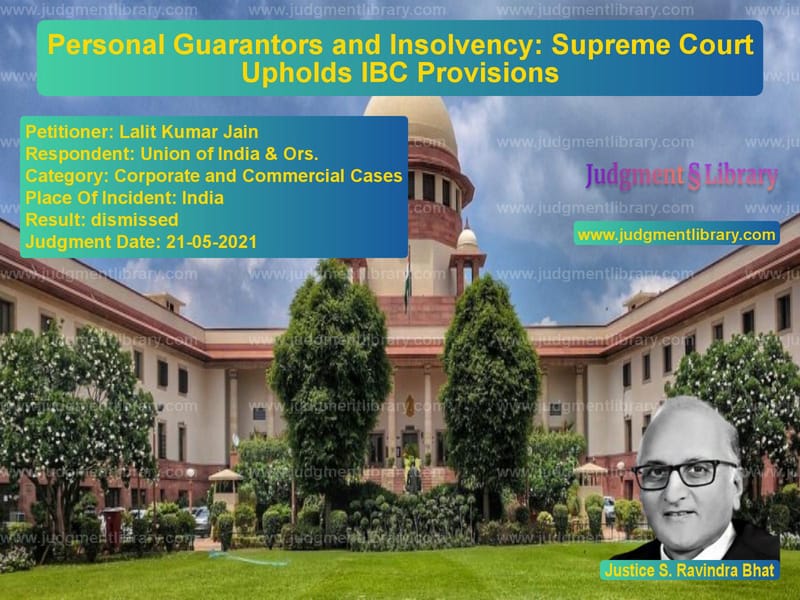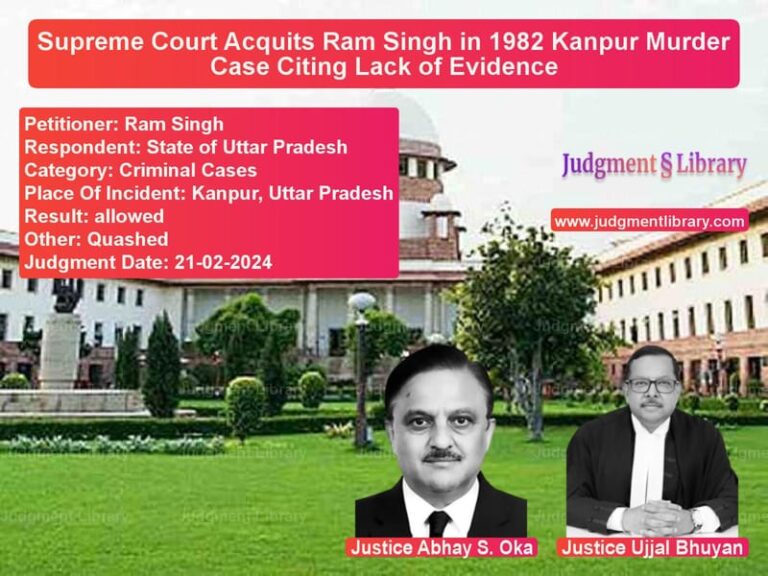Personal Guarantors and Insolvency: Supreme Court Upholds IBC Provisions
The Supreme Court of India delivered a significant judgment in Lalit Kumar Jain v. Union of India & Ors., affirming the validity of the Central Government’s notification applying provisions of the Insolvency and Bankruptcy Code, 2016 (IBC) to personal guarantors of corporate debtors. This ruling has wide-reaching implications for financial creditors, corporate borrowers, and individuals who act as guarantors for corporate loans.
Background of the Case
The case arose from multiple writ petitions challenging the notification dated November 15, 2019, which brought personal guarantors within the scope of the IBC. The petitioners, many of whom were directors and promoters of companies undergoing corporate insolvency resolution, contended that the notification was unconstitutional and beyond the legislative competence of the Central Government.
Key Legal Issues
- Whether the notification applying IBC provisions to personal guarantors was valid.
- Whether personal guarantors can be held liable for corporate debt after the company’s resolution or liquidation.
- Whether the National Company Law Tribunal (NCLT) has jurisdiction over personal guarantors.
- Whether the principle of co-extensive liability under the Indian Contract Act, 1872, applies to IBC proceedings.
Arguments by the Petitioners
The petitioners, represented by senior counsels, raised the following arguments:
- The notification selectively applied IBC provisions to personal guarantors, violating Article 14 (Right to Equality) of the Constitution.
- The IBC was designed to resolve corporate insolvencies, not personal insolvencies, making the extension to personal guarantors arbitrary.
- Under the Indian Contract Act, a guarantor’s liability is co-extensive with that of the principal debtor. Once a corporate debtor undergoes insolvency resolution, the guarantor’s liability should also be discharged.
- The Central Government exceeded its powers under Section 1(3) of the IBC by applying the law selectively.
- Personal guarantors should have the right to independent insolvency proceedings separate from those of corporate debtors.
Arguments by the Respondents (Union of India and Financial Creditors)
The Union of India and financial creditors defended the notification, stating:
- The amendment and notification were necessary to prevent personal guarantors from escaping liability when a corporate debtor defaults.
- Personal guarantors voluntarily provide guarantees, making them distinct from other individual debtors.
- The IBC’s objective is to maximize creditor recoveries, and excluding personal guarantors would defeat this purpose.
- The notification did not amend the law but merely operationalized existing provisions.
- Co-extensive liability does not mean automatic discharge of a guarantor when the corporate debtor undergoes resolution.
Supreme Court’s Observations and Judgment
1. Validity of the Notification
The Supreme Court upheld the notification, ruling:
“The Central Government acted within its powers under Section 1(3) of the IBC to bring personal guarantors under the insolvency resolution framework.”
2. Separate Liability of Personal Guarantors
The Court clarified that personal guarantors have a separate legal obligation from corporate debtors:
“A personal guarantor’s liability does not get extinguished merely because the corporate debtor undergoes resolution. The creditor retains the right to proceed against the guarantor.”
3. Jurisdiction of the NCLT
The Court affirmed that the NCLT has jurisdiction over personal guarantors:
“Section 60(2) of the IBC ensures that the insolvency proceedings of personal guarantors are handled by the same tribunal dealing with the corporate debtor’s insolvency, ensuring consistency.”
4. Contractual Obligations and Co-Extensive Liability
The Court rejected the petitioners’ argument that a guarantor’s liability is automatically discharged, ruling:
“Legal principles from contract law do not automatically extinguish a guarantor’s liability when the principal debtor’s liability is resolved under IBC.”
5. Economic and Policy Considerations
The judgment emphasized that financial discipline and credit recovery are crucial to economic stability:
“The IBC aims to ensure that credit is not provided without accountability. Allowing personal guarantors to escape liability would weaken creditor confidence.”
Impact of the Judgment
This ruling has significant implications:
- Financial institutions can now pursue personal guarantors even after corporate resolution.
- Personal guarantors must be more cautious while providing guarantees for corporate debt.
- The NCLT will handle personal guarantor cases, ensuring uniformity in insolvency proceedings.
- The judgment strengthens creditor rights and reinforces the objective of the IBC.
Conclusion
The Supreme Court’s decision affirms the applicability of IBC to personal guarantors, ensuring that financial creditors retain their rights against guarantors even after corporate resolution. This ruling will shape insolvency jurisprudence and reinforce financial accountability.
Petitioner Name: Lalit Kumar Jain.Respondent Name: Union of India & Ors..Judgment By: Justice S. Ravindra Bhat.Place Of Incident: India.Judgment Date: 21-05-2021.
Don’t miss out on the full details! Download the complete judgment in PDF format below and gain valuable insights instantly!
Download Judgment: lalit-kumar-jain-vs-union-of-india-&-ors-supreme-court-of-india-judgment-dated-21-05-2021.pdf
Directly Download Judgment: Directly download this Judgment
See all petitions in Company Law
See all petitions in Bankruptcy and Insolvency
See all petitions in Corporate Governance
See all petitions in Shareholder Disputes
See all petitions in unfair trade practices
See all petitions in Judgment by S Ravindra Bhat
See all petitions in dismissed
See all petitions in supreme court of India judgments May 2021
See all petitions in 2021 judgments
See all posts in Corporate and Commercial Cases Category
See all allowed petitions in Corporate and Commercial Cases Category
See all Dismissed petitions in Corporate and Commercial Cases Category
See all partially allowed petitions in Corporate and Commercial Cases Category







